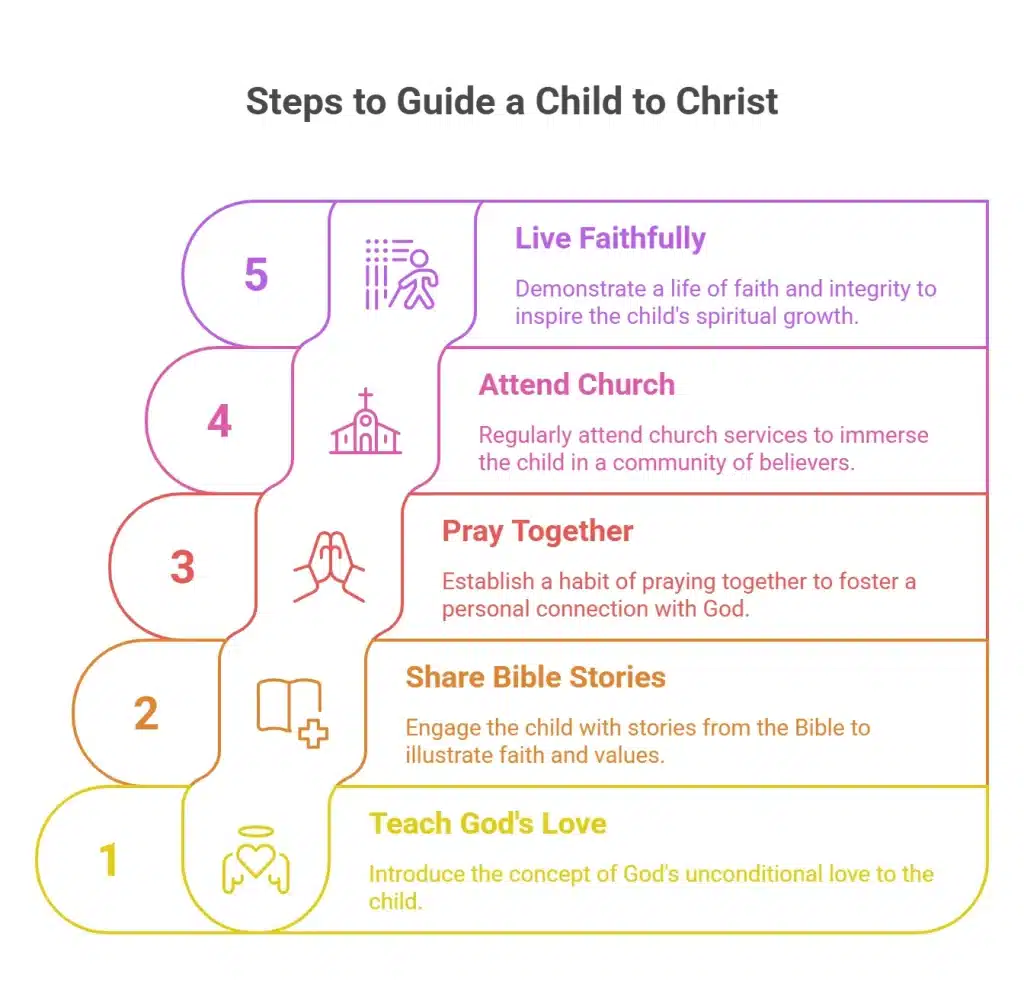10 Parenting Tips on How to Lead a Child to Christ
Discovering 10 parenting tips on how to lead a child to Christ has been a transformative journey in my own family. These approaches create natural opportunities for children to understand and embrace faith, allowing them to develop a genuine relationship with God that shapes their character and worldview.
Spiritual formation happens gradually through daily experiences, conversations, and observations. As parents, we have the privilege of creating an environment where faith can flourish naturally in our children's hearts, without pressure or manipulation.
- 10 Parenting Tips on How to Lead a Child to Christ
- 1. Model Authentic Faith
- 2. Create a Grace-Filled Home
- 3. Engage in Age-Appropriate Conversations
- 4. Answer Questions Honestly
- 5. Respect Their Spiritual Journey
- 6. Connect Faith to Everyday Life
- 7. Prioritize Church Community
- 8. Create Meaningful Family Traditions
- 9. Serve Others Together
- 10. Pray With and For Your Children
- 5 Key Bible Verses for Children's Faith Formation
- A Message to Parents: The Heart Behind the Journey
10 Parenting Tips on How to Lead a Child to Christ

1. Model Authentic Faith
Children learn more from what they observe than what they're told. When they see me praying sincerely, reading Scripture enthusiastically, and applying biblical principles in difficult situations, they witness faith in action. Jesus emphasized this modeling approach in Matthew 5:16, saying "Let your light shine before others, that they may see your good deeds and glorify your Father in heaven." My authentic relationship with Christ speaks volumes more than any formal lesson.
2. Create a Grace-Filled Home
The atmosphere of our home profoundly affects how children perceive God. By establishing an environment where mistakes are met with forgiveness, questions are welcomed with patience, and love is unconditional, I reflect God's character. Colossians 3:13 guides this approach: "Bear with each other and forgive one another if any of you has a grievance against someone. Forgive as the Lord forgave you." Children who experience grace at home more easily understand God's grace.
3. Engage in Age-Appropriate Conversations
Spiritual discussions should match a child's developmental stage. With younger children, I focus on simple truths about God's love and care, using concrete examples they can understand. As they mature, we explore deeper concepts of salvation, sin, and redemption. Deuteronomy 6:7 instructs: "Talk about them when you sit at home and when you walk along the road, when you lie down and when you get up." Natural conversations throughout the day make faith an integrated part of life.
4. Answer Questions Honestly
Children naturally ask profound spiritual questions. When faced with questions I can't fully answer, I admit my limitations while affirming what Scripture clearly teaches. Statements like "That's an excellent question. The Bible tells us this part, but some things remain mysterious" validate their curiosity while maintaining intellectual honesty. First Peter 3:15 encourages us to "always be prepared to give an answer to everyone who asks you to give the reason for the hope that you have," even our children.
5. Respect Their Spiritual Journey
Each child's faith development follows a unique timeline. Pressuring children into premature professions of faith can lead to confusion or superficial belief. Instead, I nurture their natural spiritual curiosity and pray for God's timing. Romans 8:14 reminds us that "those who are led by the Spirit of God are the children of God." Respecting their individual journey shows trust in God's work in their lives.
6. Connect Faith to Everyday Life

Biblical application happens in everyday moments. While helping a child share toys, I might reference Jesus's teaching about treating others as we want to be treated (Matthew 7:12). During a thunderstorm, we might discuss how God's power is greater than anything that scares us (Psalm 29:3-4). These connections help children see faith as practical and relevant.
7. Prioritize Church Community
Active participation in a faith community provides children with diverse spiritual role models and peer relationships that reinforce biblical values. Hebrews 10:25 encourages "not giving up meeting together, as some are in the habit of doing, but encouraging one another." When children see others beyond their parents living out faith, it validates the universal nature of Christian belief.
8. Create Meaningful Family Traditions
Special rituals around holidays, weekly Sabbath observances, or bedtime prayer routines create meaningful touchpoints for spiritual formation. These traditions provide natural opportunities to discuss biblical stories and principles. Psalm 78:4 speaks to this approach: "We will tell the next generation the praiseworthy deeds of the LORD, his power, and the wonders he has done." Family traditions become beloved vehicles for passing down faith.
9. Serve Others Together
Participating in service projects as a family demonstrates faith in action and cultivates compassion. Whether serving at a food bank, helping elderly neighbors, or supporting a missionary family, these experiences embody Jesus's teaching in Matthew 25:40: "Whatever you did for one of the least of these brothers and sisters of mine, you did for me." Children learn that following Christ means loving others tangibly.
10. Pray With and For Your Children
Regular prayer with children teaches them to communicate with God naturally. Equally important is letting them know you pray for them privately. As James 5:16 teaches, "The prayer of a righteous person is powerful and effective." Hearing a parent pray specifically for their challenges, relationships, and spiritual growth helps children recognize God's involvement in every aspect of life.
5 Key Bible Verses for Children's Faith Formation

1. John 3:16 - God's Love
"For God so loved the world that he gave his one and only Son, that whoever believes in him shall not perish but have eternal life." This verse captures the essence of the gospel in simple terms children can grasp—God's extraordinary love demonstrated through Jesus.
2. Psalm 139:14 - Personal Value
"I praise you because I am fearfully and wonderfully made; your works are wonderful, I know that full well." This verse helps children understand their inherent worth as God's creation, countering cultural messages about their value.
3. Proverbs 3:5-6 - Trust
"Trust in the LORD with all your heart and lean not on your own understanding; in all your ways submit to him, and he will make your paths straight." This guidance about trusting God's wisdom over our limited perspective serves children throughout life.
4. 1 John 1:9 - Restoration
"If we confess our sins, he is faithful and just and will forgive us our sins and purify us from all unrighteousness." This verse introduces children to the cycle of confession, forgiveness, and restoration central to an authentic relationship with God.
5. Matthew 22:37-39 - Core Commandments
"Love the Lord your God with all your heart and with all your soul and with all your mind… Love your neighbor as yourself." Jesus identified these as the greatest commandments, providing children with a simple framework for understanding Christian living.
A Message to Parents: The Heart Behind the Journey
Leading a child to Christ isn't primarily about teaching perfect theology or ensuring they pray a specific prayer. Rather, it's about nurturing an environment where they can authentically encounter God's love and truth. As jasonkallen.com notes, "Children do not have to become like adults to be saved; adults have to become like children. When Jesus made this point in Matt. 18, he was not referring to spiritual innocence. Rather, he commended a spirit of humility, dependence, and deference."
The window of childhood provides unique spiritual opportunities. According to focusonthefamily.com, "if your children do not come to faith in Christ by the time they are teens, the likelihood begins to quickly decrease that they will do so." This doesn't mean forcing premature decisions but recognizing the receptivity of young hearts.
Remember that your consistent, loving presence speaks volumes about God's character. As cefonline.com points out, "the parent/child relationship is the pattern that God chose to exemplify our relationship with Him." Through your imperfect but sincere parenting, children glimpse the heart of their perfect heavenly Father.
Leave a Reply

Related Posts